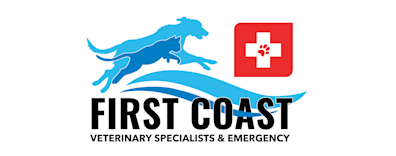Preparing Your Pet Sitter for an Emergency - Keeping Your Pet Safe During the Holidays
Pet Safety

If your pet experiences a medical emergency while under a sitter's care, having a clear plan in place can make all the difference. Remember, First Coast Veterinary Specialists & Emergency is open 24/7/365, ensuring your pet has access to expert care whenever they need it.
Set Clear Expectations for Emergencies
Emergencies can be overwhelming for sitters, so provide them with detailed instructions. Be specific about what qualifies as an emergency, like trouble breathing, persistent vomiting, accidents, or any sudden, severe symptoms. Empower them to act quickly and decisively if your pet’s health is at risk.
Plan for Financial Responsibility
Veterinary emergencies can be costly, and it’s essential to address financial matters ahead of time:
Establish Spending Limits: Specify how much you’re comfortable spending without prior approval.
Decide Who Pays: Let your pet sitter know if they should use your credit card, contact a designated family member, or cover the cost temporarily for reimbursement later.
Provide Payment Information: Share a credit card on file with your vet if possible. If applicable, be sure to provide details on your pet insurance policy.
Provide Emergency Contact Information
Life happens, and you might not be reachable in the moment. Create a backup plan by:
Listing an emergency contact—someone you trust to make medical decisions for your pet. Include their name, phone number, and address.
Provide veterinarian details, including your primary veterinarian and a 24/7 emergency care provider. First Coast Veterinary Specialists & Emergency is available 24/7 at 301 Jacksonville Drive, Jacksonville Beach, FL, 32250 and can be contacted at (904) 853-6310.
Prepare a Medical History Packet
A sitter may not know your pet’s health history as well as you do. Make it easy for them to access:
A list of your pet’s current medications, dosages, and schedules.
Any known allergies or chronic conditions.
Vaccination records and recent medical history.
This information will help veterinary professionals provide faster and more accurate care in an emergency.
Holiday-Specific Considerations
The holidays bring unique risks for pets, such as ingesting decorations, rich holiday foods, or foreign objects. Make sure your sitter knows how to avoid these hazards and monitor for warning signs like vomiting or lethargy.
Emergencies are stressful, but preparation can ease the burden. By setting clear expectations, preparing documents, and ensuring open communication, you can help your pet sitter act quickly and confidently. Your planning could be the key to saving your pet’s life in an emergency.
If your pet needs urgent or specialized care, remember that First Coast Veterinary Specialists & Emergency is here to provide compassionate, expert care at any time, day or night!
